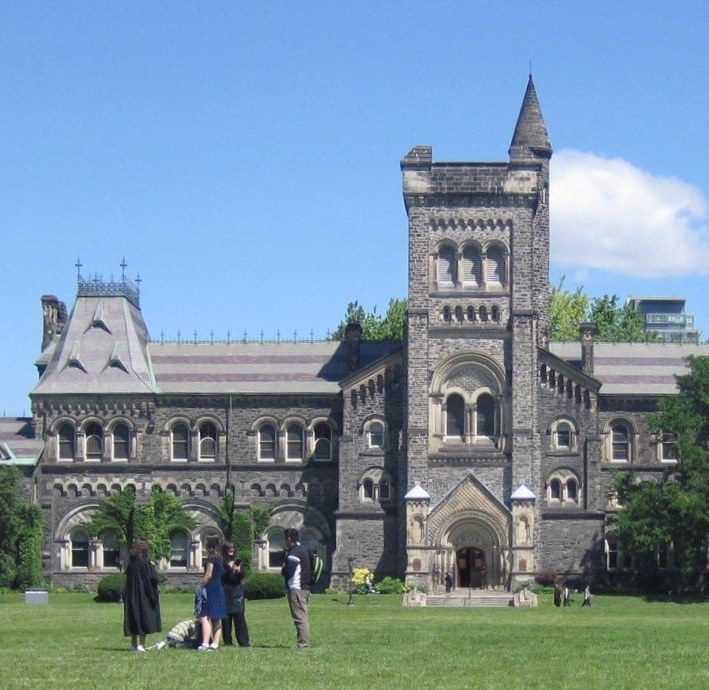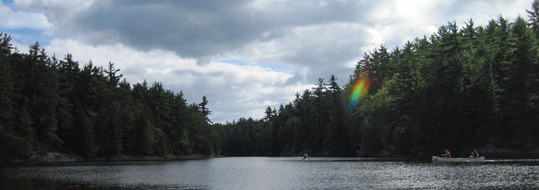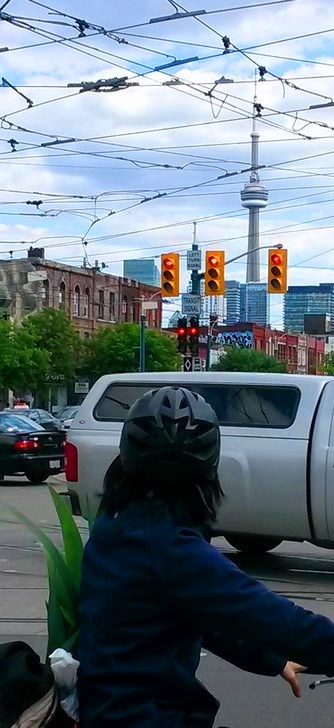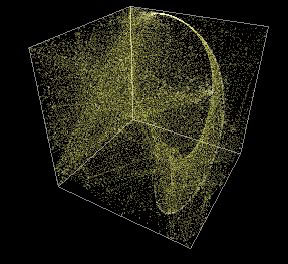PAGE CONTENTS:
SAND Conference Scope
Dates
Conference Topics & Publication
This Year's Theme: Consciousness, Autonomy and Responsibility to Other
Accommodations
U of T & the City of Toronto
Scientific Retreat & Canadian Wilderness Activities
Accessibility and Child Care
Organizing and Scientific Committee
Meeting Sponsors
Why Autonomous Neural Systems?
Why Autonomous Neurodynamics and Neurological Conditions?
Meeting Background
SAND CONFERENCE SCOPE
Autonomous Neurodynamics describes interactive systems that can change activity both in response to and independently of the environment.
Presentations will focus on the theoretical underpinnings and implications of autonomous dynamics in relation to neural activity, cognition, social systems and general network dynamics.
Sessions may encompass a broad array of approaches including presentations from mathematics, physics, philosophy, psychology, social studies, legal theory, evolutionary factors,
developmental biology, anthropology, computational and theoretical neurosciences.
DATES
Presentations and roundtable: Tuesday, August 2 - Thursday, August 4, 2016
Post-presentation scientific retreat & wilderness expedition activities: Thursday, August 4 - Sunday, August 7, 2016
Recommended latest arrival: Monday, August 1, 2016
Recommended earliest departure, presentations portion only: Friday, August 5, 26016
Recommended earliest departure, retreat & expedition participants: Monday, August 8, 2010
CONFERENCE TOPICS & PUBLICATION
SAND conference presentations typically encompass a wide range of themes that have included:
Physiology, Sensorimotor Systems & Behavior
Neurogenetics & Neuroanatomy
Biochemistry, Pharmacology & Nutrition
Particle & Statistical Physics
Hormones & Reproduction
Neurology & Clinical Perspectives
(e.g., Epilepsy, Parkinson's, Alzheimer's)
Attention, Memory, Sleep, Addiction & Creativity
Social Sciences & Social Work
Neuropsychoanalysis
Environmental Factors, Green Neuroscience
Embodied Modeling / Autonomous Agents
|
Dynamical Systems / Nonlinear Analysis
Cognitive Science & Cognitive Neuroscience
Personal & Community Narratives
Open & Collaborative Science
Gender & Cultural Studies
Art & Creativity
Network Theory
Computation & Information Theory
Philosophy of Mind / Consciousness
Epistemology / Metaphysics
The Role of Noise / Stochasticity / Randomness
|
In addition to these topics we welcome novel approaches and interdisciplinary research that can synthesize findings from various fields.
Presentations may also consider the implications of research findings on ethical theory, autonomy and health.
Accordingly, we encourage presentations that examine changes in neurodynamics in neurological conditions such as
epilepsy, Parkinson's, and Alzheimer's that can have a tremendous impact on an individual's autonomy and quality of life.
Investigations may also include more common conditions in which changes in neural dynamics impact volitional activity such as sleep.
Presentations may be considered for inclusion in a special post-conference publication.
ANNUAL THEME - CONSCIOUSNESS, AUTONOMY AND RESPONSIBILITY TO OTHER
Every year SAND meetings also include a theme and roundtable topic(s).
This year's theme will focus on the interactions of Consciousness, Autonomy and Responsibility to Other.
We particularly encourage discussion on the relationship between consciousness and autonomy both at the theoretical level and underlying physical mechanisms.
Conversely, what are the ethical consequences and responsibilities we hold as scientists and individuals to other beings and the natural world?
Connecting your presentation to the annual theme is not required but is appreciated.
ACCOMMODATIONS
Accommodations at University of Toronto residences may be available during the meeting. Please indicate your interest on the registration form. Limited spots. First-come, first-served policy.
Click here for additional information on accommodations.

U OF T & THE CITY OF TORONTO
This year SAND returns to its original meeting place in Toronto, Canada. The meeting will be held at the University of Toronto (U of T),
Canada's largest university and in the heart of Canada's largest city. U of T remains a hub for highly multidisciplinary and collaborative research groups and institutes,
and a world-renowned public health research network. Toronto is famous for its diversity and vibrant culture.
Returning and new participants alike will enjoy the eclectic mix of small distinctive neighborhoods, museums, festivals and night life as the city comes alive with summer energy.
SCIENTIFIC RETREAT & CANADIAN WILDERNESS ACTIVITIES
The aim of the retreat is to help free our thoughts and situate the meeting discussions within the context of the natural world.
The retreat has often been the catalyst for the best of SAND ideas and collaborations.
This year, the scientific retreat will take place in the wilderness of the serene Algonquin Provincial Park and QE Highlands in the Great Lakes Basin and will including a canoe trip.
The canoe excursion will include swimming, hiking, and outback style camping.
We will paddle by islands, inland forests and lakes as we continue to discuss and consider the scientific and philosophical questions in the Canadian wilderness.
Limited spots. First-come, first-served policy.
Additional excursion information will be made available on this page

ACCESSIBILITY AND CHILD CARE
Accessibility and diverse participation are important SAND principles. All presentations will take place in accessible venues and there are no registration, attendance or presentation fees.
Travel, accommodation and food costs for the scientific retreat activities are kept to a minimum.
Grants to assist with travel, accommodations and child care arrangements may be available.
Priority is given to students, fellows and patient advocate participants.
Please indicate any requirements during online registration.
ORGANIZING AND SCIENTIFIC COMMITTEE:
- Ann Lam, The Physicians Committee for Responsible Medicine (PCRM);
The Green Neuro Lab, Neurolinx &
the Institute for Green & Open Sciences (IGOS), Canada & USA (CHAIR)
- Elan Liss Ohayon, The Green Neuro Lab, Neurolinx &
the Institute for Green & Open Sciences (IGOS), Canada & USA (CO-CHAIR)
- Collins Assisi, Indian Institute of Science Education and Research (IISER), India
- W. McIntyre Burnham, University of Toronto Epilepsy Research Program, Canada
- Peter Carlen, University of Toronto, Toronto Western Research Institute, Canada
- Phuonguyen (Hailey) Chu, The Green Neuroscience Laboratory & University of California, Los Angeles (UCLA), USA
- Kathryn Hum, University of Toronto Epilepsy Research Program, Canada
- Julie Hwang, Women's Healthy Environments Network (WHEN) &
the Institute for Green & Open Sciences (IGOS), Canada
- Stiliyan Kalitzin, Dutch Epilepsy Clinics Foundation (SEIN), The Netherlands
- Maciej Labiecki, Warsaw University, Poland
- Suhita Nadkarni, Indian Institute of Science Education and Research (IISER), India
- Piotr Suffczynski, Warsaw University, Poland
- Paul Tsang, University of Toronto, the Ontario Institute for Studies in Education (OISE) &
The Green Neuro Lab, the Institute for Green & Open Sciences, Canada
- Ping Wang, Computational Neurobiology Laboratory (CNL), Salk Institute, USA
MEETING SPONSORS:
WHY AUTONOMOUS NEURAL SYSTEMS?
Clearly neural systems can perform incredibly complex computations but what are the features that underlie their autonomy?
How do healthy embodied brains remain independent from the dynamics of the world while also being responsive?
How do neural networks find balance yet avoid infinite repetition or silence?
Emerging techniques in complexity sciences and neural modeling provide the tools to explore dynamics in such systems but
have yet to explain how daily computational tasks are accomplished in a continuous and autonomous fashion.
These questions regarding system autonomy are often independently explored in physics, mathematics, philosophy and other fields.
The issue of increasing freedom in systems is at the foundations of cognitive and social sciences.
WHY AUTONOMOUS NEURODYNAMICS AND NEUROLOGICAL CONDITIONS?
The most devastating aspect of a neurological condition is often the impact on independent activity.
For example, in epilepsy the changes in neurodynamics result in an acute and often devastating loss of freedom,
in which an individual's autonomy is lost and regained in very sudden and dramatic ways.
The generally unpredictable nature of this transition to a state of partial or total functional neuronal impairment
makes epilepsy more a dynamical system condition than a product of any single factor.
Why and how does the transition occur and why and how does the epileptic state terminate?
Are these transitional states a by-product of a complex neuronal system meant for autonomous operation in changing environments?
Do these transitions hint at fundamental neuronal mechanisms?
At the other extreme, aging is an example of a process in which changes to neurodynamics come about very gradually but can be no less devastating.
Neuroscience researchers are often focused on controlling phenomena, forgetting that an important goal is to increase individual autonomy.
There are many routes to changing neural dynamics, the difficulty is ensuring that as a consequence the individual becomes more autonomous rather than less so.
What can theories of autonomous systems tell us about treating these conditions?
What can these conditions tell us about how complex systems maintain freedom in the environment?
MEETING BACKGROUND
The first meeting of the Society for Autonomous Neurodynamics was held at the University of Toronto, in August 2004.
Subsequent meetings took place at the Institute of Experimental Physics, Warsaw University (2005), the Marine Biology Station, Eilat, Israel (2006), Laval University, Quebec (2007),
SEIN in the Netherlands (2008), the University of California San Diego (UCSD) & the Salk Institute for Biological Studies in La Jolla, California (2009)
and the University of Toronto (2010). In 2011 SAND held its first meeting in Asia at the Bangkok General Hospital and Srinakharinwirot University in Thailand.
In 2012 the meeting was held at the Green Neuroscience Laboratory, San Diego, California and at the National Autonomous University of Mexico (UNAM) in Ensenada, Baja California (2012).
The 2013 meetings took place at the Indian Institute for Science Education and Research (IISER), Pune, India (2013). SAND 2014 was held at the Pasteur Institute, Paris (2014).
The SAND meeting returned to the Netherlands and SEIN last year for its 12th iteration (2015).
The meetings have included empirical scientists, theoreticians and personal reports. They have proven to be cognitively intense, high-energy, autonomous events in a fun and informal atmosphere.
The gatherings also mark the continuation of an international collaboration on the subject between researchers in the Netherlands, USA, Thailand and Canada including
the Dutch Epilepsy Clinics Foundation (SEIN), the Thai Neurological Society, Neurolinx Green Neuroscience Laboratory and the University of Toronto Epilepsy Program.
Please send comments to: ohayon@chass.utoronto.ca
Last modified: July 15, 2016
Society for Autonomous NeuroDynamics (SAND) Homepage
University of Toronto homepage |



